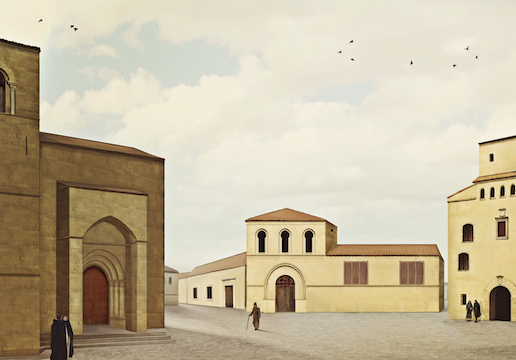A paper presented, by RLMD, at the 50th International Congress on Medieval Studies, Western Michigan University (Kalamazoo, MI), on the “What’s New in the Digital Humanities (A Roundtable)” Session, 16 May 2015.
Virtual Plasencia is the collective work of Dr. Victor R. Schinazi (ETH-Zurich), Dr. Paddington Hodza (U. of Wyoming), Dr. Mubbasir Kapadia (Rutgers University), Zatun Inc., and Dr. R. L. Martinez-Davila.
Sections of the Paper:
| Time Marker | Content |
|---|---|
| 00:01 | Introduction |
| 01:15 | Why Digital Humanities? We are Digital Annalists |
| 04:45 | Three Aspects of Our Work – (1)”Deciphering Secrets” Massive Open Online Course, (2) The Revealing Cooperation and Conflict Project, and (3) Virtual Plasencia. Additionally, I discuss our next steps. |
| 06:00 | Activating Curiosity — “Deciphering Secrets: Unlocking the Manuscripts of Medieval Spain” Massive Open Online Course (MOOC) |
| 10:00 | The Importance of Collaborative Relationships and Negotiating Agreements to Supporting Interdisciplinary Work |
| 11:48 | Crowdsourcing — What is It? How to Mobilize the General Public in Scholarly Research. Wired Magazine’s Observations: Hyper-connectivity, Critical Mass, and Energy |
| 14:00 | Let’s Crowdsource. An Example of How to Crowdsource the Transcription of Manuscripts to Collect New Data and Engage Global Citizen Scholars |
| 18:48 | The Results from Crowdsourcing — Visualization Historical Information on Digital Maps |
| 27:14 | The Direct Research Benefit of MOOCs. Opportunities for New Types of Publications — Digital eBooks, Online Collections, Online Teaching Materials, Scholarly Critical Editions |
| 29:12 | The Revealing Cooperation and Conflict Project. What Is It? Who Are We? What Are We Doing? A Key Aspect of Our Work — Virtual Plasencia — a digital 3D world that engages the public, students, and scholars |
| 30:55 | An Example of How Dynamic Educational/Entertainment Videos Can Engage the Public. On-site lecturing from Madrid, Spain. Visiting Cultural Sites Like the Mercado de San Miguel. “Showing” How We Will Recreate Virtual Plasencia |
| 39:36 | A Tour of Virtual Plasencia V1.0, a 3D reconstruction of the medieval city. We are using gaming engines like Unity to share dynamic and exciting historical narratives for educational purposes |
| 44:04 | Avatars and Interactivity. Our Next Steps: Creating Virtual Plasencia, Version 1.7, which incorporates human and computer-controlled avatars. We are now building digital narratives that use avatars to perform historical events. Additionally, we will create a “playable” game space where the public and students can “live” and “participate” in historical events. This is an important element of having students use applied knowledge. |
| 46:50 | Why Are We Doing This Work? It’s About Our Common Destiny – A Quote from Pablo Neruda. It’s About a Comprehensive Process of Engaging Global Citizen Scholars in the Creation of New Knowledge |
